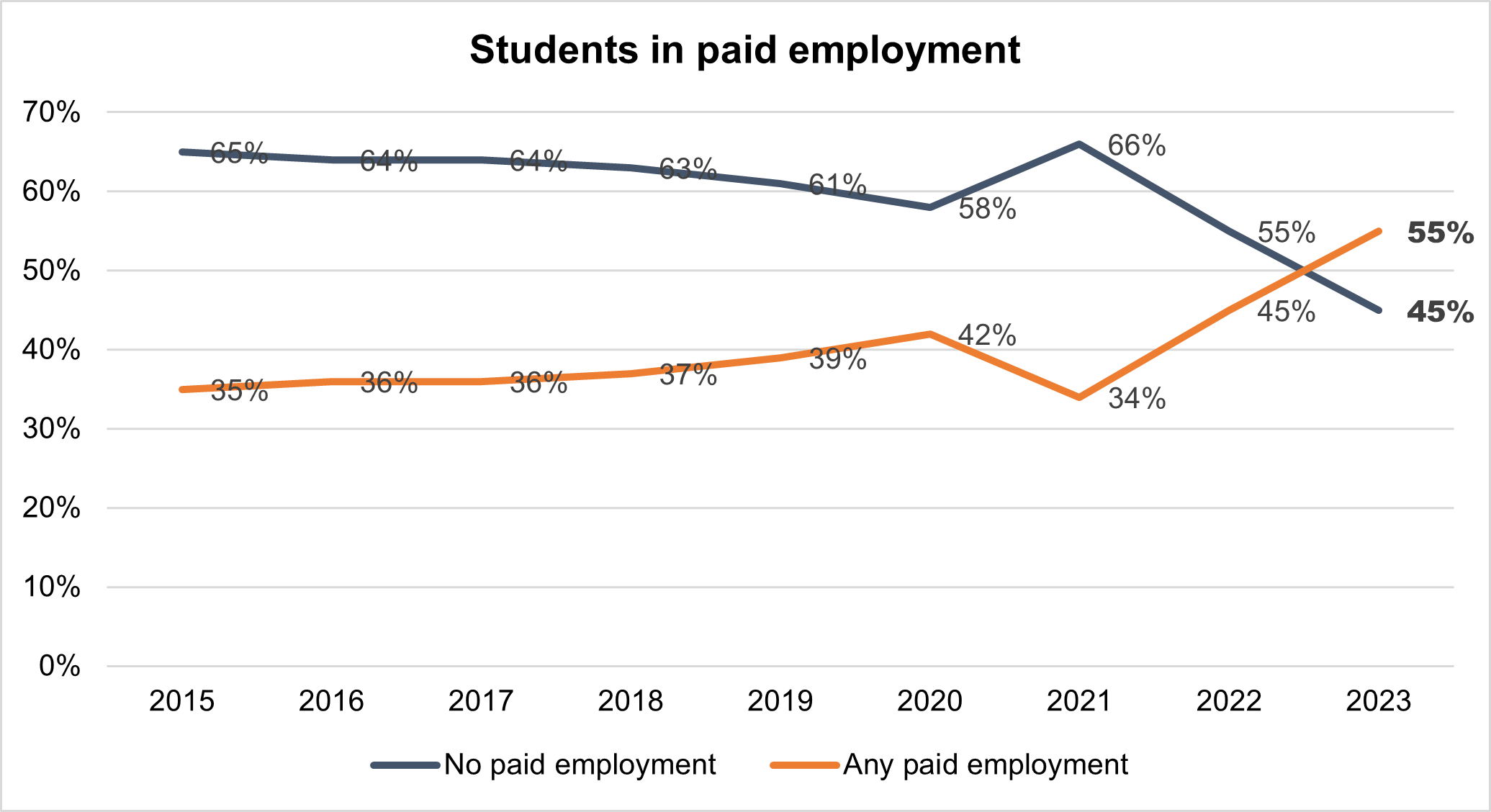The Cost of Living and Its Impact on the Student Experience: What Student Polling Tells Us
The extent of the current cost-of-living crisis affecting much of UK (and indeed, Global) society is well documented. At any point in time, unrelated to the prevailing financial climate, Higher Education students often represent some of those members of society who face a range of financial challenges, with higher education representing an often-increasing financial investment.
Hence, while it does not make it any more palatable for those impacted, it is not entirely surprising to learn that many higher education students are being particularly affected by the current cost-of-living challenges affecting much of the UK.
However, while this may not be highlighting something unknown to many people working or studying in the sector, it is important to consider that as well as impacting key aspects of day-to-day lives, students’ overall views of the quality of their experience are taking on a very different context. To illustrate this, there are a variety of useful, and striking data available, drawn from a range of student polling over the past year, which help to put these challenges into context and can help to drive conversations around how we can best provide support to those facing them.
Value-for-Money and Financial Challenges
The Advance HE-HEPI Student Academic Experience Survey (SAES) has become one of the main sources of student insights on value-for-money and what drives this. Often a challenging measure, how to deliver value for money is a regular key consideration at the heart of discussions around how the sector can meet the needs of students as consumers.
One of the main drivers of perceptions of value is the volume of contact hours, which many students equate, in their minds, to representing what their tuition fees are “worth”. These volumes understandably declined during the pandemic, but have since recovered, which may have been expected to drive an increase in value perceptions. However, value for money, as measured by the SAES, has remained relatively low, with just 37% overall feeling they have received good value. This implies that something else is impacting things.
Source: Student Academic Experience Survey 2023
As the chart above shows, cost of living concerns are now the single most important reason why students responding to the survey perceive they have received poor value for money – representing a strong increase over the past 2 years. There is also other evidence from the same survey along similar lines, for example, mentions of financial difficulties as a reason for considering leaving the course have doubled in the past 2 years, while three quarters of all students responding (76%) feel their studies have been affected by cost-of-living concerns. All these data point towards a clear link between value for money (as perceived) and financial challenges (as experienced), which underlines the difficulties Higher Education Institutions (HEIs) face whenever value-for-money makes the headlines – that it is extremely difficult to demonstrate what value looks like in an environment where students are facing unprecedented financial pressures.
The Postgraduate Voice
Much of the data, and the literature, covering how students are experiencing cost-of-living challenges is focused on undergraduates. However, the recently published Advance HE Postgraduate Taught and Postgraduate Research Experience Surveys (PRES & PTES) provide the opportunity to shine a light on the Postgraduate Voice. Although not the main focus of these surveys, there is key evidence of financial challenges in findings from both in 2023. Specifically, there has been a notable increase in the proportion of Postgraduates citing financial concerns as the main reasons for considering leaving their studies. For Postgraduate Taught students, this has increased from 7% to 11% since 2021 but is still relatively low. However, for Postgraduate Researchers, there is evidence of greater financial impact, with 17% if those who considered leaving citing financial issues – nearly doubling from 9% in 2021.
To increase the focus on the Postgraduate view, Advance HE will be including further questions about cost-of-living in the Postgraduate Surveys for 2024.
The Impact of Financial Concerns on the Student Experience
There is a range of data which illustrates how the student experience in being impacted by cost-of-living challenges. This evidence points towards a situation described by Professor Sir Chris Husbands, Vice Chancellor of Sheffield Hallam University as follows “The challenge of cost of living for students is fundamental and is driving enormous disparities in student experience. Materially well-off students are able to enjoy an engagement with HE which we could call the ‘full-fat’ experience and those from materially deprived homes are doing ever more part-time work.”
Source: Student Academic Experience Survey 2023
Echoing the above quote, one of the most striking data points from this year’s Student Academic Experience Survey is highlighted above. The proportion of (full time undergraduate) students spending time in paid work has jumped from being a minority (45%) to a majority (55%) in just one year. Deeper analysis tells us that mature students are even more likely to be working – rising to 71% of those aged 26 and over.
Related to this, there is evidence of changes in how some students are interacting with university life, including spending less time on campus, and/ or having less time to engage with developmental activities. Data from the Office for National Statistics (ONS) Cost of Living Insights Study has identified that some students are spending more time at home (and therefore less time on campus) and are making difficult choices about which non-compulsory elements of their course they can engage with. The ONS data also points towards some students feeling they have fewer opportunities to meet others, or to take part in wider activities on or around campus.
Although not directly linked in the ONS data, there is potentially a logical link between students working part time, having to save time or money by travelling to campus less frequently, and subsequently not benefitting from the full variety of experiences on offer at their institution. This, in turn, may impact the experiences of other students. For example, the Student Academic Experience Survey (2022) highlights that student belonging is strongly influenced by interacting with a wide variety of students and being on or around campus – something that is becoming more difficult for some student cohorts.
Another consequence of a changing student experience is the extent to which increased working part time (or full time) may be impacting students’ wider development. By its very nature, employment in termtime is not typically related to the course being studied, and may be less developmental than other ways of spending time such as extra-curricular activities or volunteering. This is underlined by previous data from the UK Engagement Survey, which highlights that, across 12 different skills, students who spent time in employment were less likely to develop skills in several areas compared to those who spent time in sport and societies and/ or volunteering – both of which are likely to come under pressure as financial difficulties take effect.
Source: UK Engagement Survey 2019. The chart shows the percentage difference in the development of each skill between students who participated in each activity compared to students who did not participate at all.
Supporting the changing experience
We are potentially experiencing a situation where financial difficulties, as well as impacting the lives and wellbeing of students, are affecting campus life, which is in turn impacting on how students develop, as well as how other students benefit from being in and around campus with them.
Recognising and responding to these changes will be key to enable HEIs to complement the range of direct financial and non-financial support they are already providing to those most in need.
Key issues for the sector to consider will include how to ensure extra-curricular developmental opportunities are available flexibly – in terms of timetabling and location – so that they are accessible to those who are on campus less frequently and/ or are in paid employment. Building a sense of belonging, both on and off-campus is also a key consideration, as is trying to ensure that pressures faced by students either through employment, commuting, or caring, are recognised and appropriate support provided to help maximize the quality of the experience for all students in these especially challenging times.
About the author
Jonathan Neves joined Advance HE in 2015, bringing with him 16 years’ experience in customer insight and market research. Jonathan began his career with TNS in London and has worked for market research agencies Quaestor and Optimisa, and also client-side at The Co-op, before specialising in Education, spending 8 years heading up research & insight at Learndirect, one of the UKs largest online learning and apprenticeship providers. Jonathan graduated from the University of Liverpool with a degree in Geography, and is a full member of the Market Research Society.
Heading up the student surveys portfolio at Advance HE, Jonathan is lead-author of the Advance HE-HEPI Student Academic Experience Survey report, and is responsible for the overall strategy for the UK Engagement Survey as well as the Postgraduate Taught and Research Experience Surveys (PTES and PRES).








